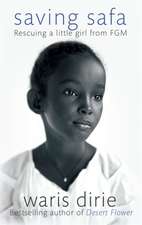Jacketed Women: Qualitative Research Methodologies on Sexualities and Gender in Africa
Editat de Jane Bennett, Charmaine Pereiraen Limba Engleză Paperback – 27 mar 2013
In 2004, the African Gender Institute ran the continental research project Mapping Sexualities. Among its objectives was the development of a research methodology for producing in-depth case studies of the dynamics of gender and contemporary sexual cultures in Ghana, Nigeria, South Africa, and Uganda.
Jacketed Women is the result of that research. The chapters cover broadranging issues and include questions about what it means to research topics that are unpopular or fraught with the sense of the taboo that underpins much work in sexualities and gender studies. Overall, the diverse pieces within the collection offer the opportunity to see qualitative research not as the "poor cousin" of quantitative studies but as a zone which raises intellectual and political challenges.
Jacketed Women is the result of that research. The chapters cover broadranging issues and include questions about what it means to research topics that are unpopular or fraught with the sense of the taboo that underpins much work in sexualities and gender studies. Overall, the diverse pieces within the collection offer the opportunity to see qualitative research not as the "poor cousin" of quantitative studies but as a zone which raises intellectual and political challenges.
Preț: 296.75 lei
Nou
Puncte Express: 445
Preț estimativ în valută:
56.79€ • 59.71$ • 46.92£
56.79€ • 59.71$ • 46.92£
Carte tipărită la comandă
Livrare economică 17 aprilie-01 mai
Preluare comenzi: 021 569.72.76
Specificații
ISBN-13: 9789280812275
ISBN-10: 9280812270
Pagini: 224
Dimensiuni: 152 x 229 x 17 mm
Greutate: 0.35 kg
Editura: Brookings Institution Press
Colecția United Nations University Press
ISBN-10: 9280812270
Pagini: 224
Dimensiuni: 152 x 229 x 17 mm
Greutate: 0.35 kg
Editura: Brookings Institution Press
Colecția United Nations University Press
Notă biografică
Jane Bennett is an associate professor and the director of the African Gender Institute based at the University of Cape Town.
Charmaine Pereira teaches in the Sociology Department of Ahmadu Bello University, Zaria.
Charmaine Pereira teaches in the Sociology Department of Ahmadu Bello University, Zaria.
Descriere
A United Nations University Press with University of Cape Town (UCT) Press publication
In 2004, the African Gender Institute ran the continental research project Mapping Sexualities. Among its objectives was the development of a research methodology for producing in-depth case studies of the dynamics of gender and contemporary sexual cultures in Ghana, Nigeria, South Africa, and Uganda.
Jacketed Women is the result of that research. The chapters cover broadranging issues and include questions about what it means to research topics that are unpopular or fraught with the sense of the taboo that underpins much work in sexualities and gender studies. Overall, the diverse pieces within the collection offer the opportunity to see qualitative research not as the "poor cousin" of quantitative studies but as a zone which raises intellectual and political challenges.
In 2004, the African Gender Institute ran the continental research project Mapping Sexualities. Among its objectives was the development of a research methodology for producing in-depth case studies of the dynamics of gender and contemporary sexual cultures in Ghana, Nigeria, South Africa, and Uganda.
Jacketed Women is the result of that research. The chapters cover broadranging issues and include questions about what it means to research topics that are unpopular or fraught with the sense of the taboo that underpins much work in sexualities and gender studies. Overall, the diverse pieces within the collection offer the opportunity to see qualitative research not as the "poor cousin" of quantitative studies but as a zone which raises intellectual and political challenges.









